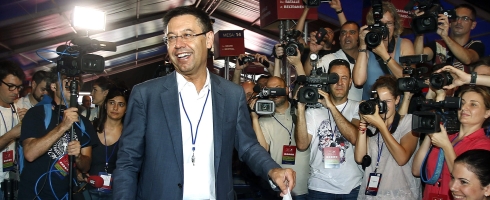Saturday night saw the re-election of Josep Maria Bartomeu as Barcelona President. The 52-year-old fought off the challenges of three rival candidates including that of Joan Laporta, who held the position between 2003 and 2010.
Laporta – a politician whose enthusiasm for Catalunyan independence is so strong that he formed his own [short lived] political party, Democracia Catalana – is fiercely proud of the history and identity of Barcelona as both a club and a city. Whilst he accepted Saturday’s defeat – despite gaining support from club legends Pep Guardiola and Johann Cruyff, he won only 33% of the vote open to Barcelona’s socios, compared to Bartomeu’s 54% – he apologised for ‘failing’ to keep the club out of the hands of a ‘prosecuted President’.
To understand what Laporta meant by this, it is vital to recognise that Laporta’s utopian vision of Barcelona and his vision for the club’s future are poles apart from that of Bartomeu. One key fundamental difference is the view of La Masia, which is widely regarded as the world’s finest youth academy.
On November 25 2012, in a League clash with Levante, substitute Martin Montoya replaced Dani Alves to complete a historic moment in Barcelona history – all 11 of the club’s players had come through La Masia: Victor Valdes, Montoya, Carles Puyol, Gerard Pique, Jordi Alba, Xavi Hernandez, Sergio Busquets, Andres Iniesta, Lionel Messi, Pedro Rodriguez and Cesc Fabregas. Furthermore, the side was coached by Pep Guardiola and assisted by Tito Vilanova.
At that moment, it appeared that the club had fulfilled the legacy of Cruyff, of promoting talent from within, placing trust in youth and playing ‘total football’. There were anomalies of course – Alba, Pique and Fabregas had spells away from the club, while Messi was imported from Argentina. But those are mere side notes. What’s more, Marc Muniesa, Cristian Tello, Jonathan dos Santos and Marc Bartra were others from the production line, all seemingly destined to be seamlessly integrated into the side.
Things panned out very differently. Of that La Masia line-up against Levante, five have departed the club with a sixth, Pedro, set to follow suit. Thiago Alcantara, long regarded as Xavi’s eventual successor, followed Guardiola to Bayern Munich, while Tito Vilanova’s tragic passing shook the club to its core.
Tello, Bojan, Jonathan, Oier Olazabal, Isaac Cuenca, Denis Suarez and Gerard Deulofeu have also departed, with the club instead splashing €170m on foreign recruits last summer, having completed the significant signing of Neymar a year previously, a signing which had much great implications for the club. Even under a player registration ban – enforced after the club were found guilty of transgressing regulations on signing young players from overseas – the club have shown no signs of this trend reversing as they complete the signing of Arda Turan.
Bartomeu is a businessman and like his predecessor Sandro Rossell, there is genuine concern that the famed youth system is being overshadowed by a raw desire for big-money signings and strengthening the club’s worldwide brand.
The President’s wish for a money-making powerhouse has also seen him come under mass pressure over the club’s shirt sponsors. Barcelona once stuck by rules of reserving sponsorship of shirts and club merchandise for children's charity UNICEF, but this came to a controversial end in the summer of 2013 when a deal was struck with Qatari Airways, owned by the much-maligned Qatari government.
This was a talking-point of the election, with Laporta promising to end these type of sponsorships while fellow leadership rival Agusti Benedito went further, arguing that by helping support a government which is alleged to have funded the Islamic State group, the club were effectively backing global terrorism.
Added to this cocktail is that Bartomeu has been dragged into the controversy over Neymar’s signing, and is involved over the ongoing investigation into alleged misappropriation of funds to sign the Brazilian. Ironically that was the precise issue which forced Rosell to resign, and his supporters have effectively transferred to Bartomeu.
Despite all the controversies, all the uncertainty and all the allegations, Bartomeu emerged victorious on Saturday, ensuring that the club will be in his hands for the next six years. The election may just have been perfect timing, his mass spending sanctions following sponsorship deals – ethically questionable or not – seemingly has brought another era of Barca dominance both in Spain and Europe.
Bartomeu is expected to push through his Espai Barca project, which he has outlined will rejuvenate Camp Nou and the surrounding area [including the stadiums of Barcelona’s B team and other sporting clubs] at an outlay of €600m. The Qatar Airways sponsorship will remain for now, even if he has promised a change in the near future to an unnamed Asian company, that he has promised will be put to a vote by the club’s socios.
Despite promises to unite the club by the new President, it looks unlikely. Laporta said immediately after defeat that Bartomeu was in ‘Qatari hands’ and ‘seeks to destroy La Masia’, while Benedito warned the club will now be ‘split in half’. It could be a long, and doubtless controversial, six years for the Catalans.

